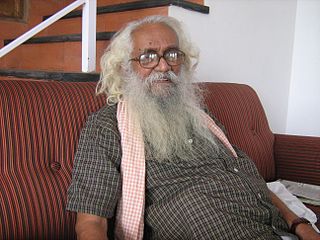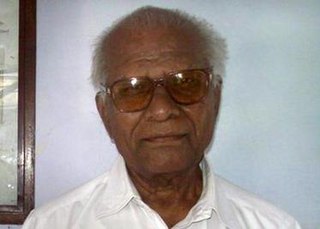
Mangalore, officially known as Mangaluru, is a major industrial port city in the Indian state of Karnataka and on the west coast of India. It is located between the Laccadive Sea and the Western Ghats about 352 km (219 mi) west of Bangalore, the state capital, 14 km north of Karnataka–Kerala border and 297 km south of Goa. Mangalore is the state's only city to have all four modes of transport—air, road, rail and sea. The population of the urban agglomeration was 619,664 according to the 2011 national census of India. It is known for being one of the locations of the Indian strategic petroleum reserves.

Basava Premanand was an Indian skeptic and rationalist from Kerala, India. He organised many tours around rural India for the promotion of scientific thinking, exposing alleged miracles and scams carried out by various charlatans and godmen while spreading awareness of dangerous superstitions. Premanand was the founder of the Federation of Indian Rationalist Associations, the convener of Indian CSICOP, and the owner-publisher-editor of the monthly magazine The Indian Skeptic, which investigates paranormal claims in India.
The Federation of Indian Rationalist Associations (FIRA) is an umbrella body of 83 rationalist, atheist, skeptic, secularist and scientist organisations in India.
Dakshina Kannada Rationalist Association (DKRA) is a well known rationalist group based in Mangalore, Karnataka, which promotes skepticism. It was formed in 1976 at the initiative of a few individuals led by Narendra Nayak. DKRA, now a member of Federation of Indian Rationalist Associations, was initially formed to host the talk by Abraham Kovoor, the eminent rationalist from Sri Lanka who was then touring India as part of his Miracle Exposure Campaign.

Mangalore International Airport is an international airport serving the coastal city of Mangalore, India. It is one of only two international airports in Karnataka, the other being Kempegowda International Airport, Bangalore. Mangalore International Airport is the second busiest airport in Karnataka. In addition to domestic destinations, flights depart daily for major cities in the Middle East. The airport was named Bajpe Aerodrome, when it opened on 25 December 1951 by former Prime Minister Jawaharlal Nehru who arrived on a Douglas DC-3 aircraft.

Cricket is by far the most popular sport in Karnataka with International cricket matches attracting a sizeable number of spectators who are willing to pay more than the standard ticket price to get a chance to watch the match. The sports related infrastructure is mainly concentrated in Bangalore which also played host to the 4th National Games of India in the year 1997. Bangalore is also the location of the Sports Authority of India (SAI) which is the premier sports institute in the country. Karnataka is sometimes referred to as the cradle of Indian swimming because of high standards in swimming compared to other states.

Narendra Achyut Dabholkar was an Indian physician, social activist, rationalist and author from Maharashtra, India. In 1989 he founded and became president of the Maharashtra Andhashraddha Nirmoolan Samiti. Triggered by his assassination in 2013, the pending Anti-Superstition and Black Magic Ordinance was promulgated in the state of Maharashtra, four days later. In 2014, he was posthumously awarded the Padma Shri for social work.

Malleshappa Madivalappa Kalburgi was an Indian scholar of Vachana sahitya in the Kannada-language and academic who served as the vice-chancellor of Kannada University in Hampi. A noted epigraphist of Kannada, he was awarded the National Sahitya Akademi Award in 2006 for Marga 4, a collection of his research articles.
Around 0.7 million people in India did not state their religion in the 2001 census and were counted in the "religion not stated" category. They were 0.06% of India's population. Their number has significantly increased four times, from 0.7 million in the 2001 census to 2.9 million in the 2011 census at an average annual rate of 15%. According to the 2012 WIN-Gallup Global Index of Religion and Atheism report, 81% of Indians were religious, 13% were non-religious, 3% were convinced atheists, and 3% were unsure or did not respond, while a demographic study by Cambridge University Press in 2004 found that around 2-6% of Indians identified as atheists or irreligious.
Mangaloreans are a collection of diverse ethnic groups that hail from the historical locales of South Canara (Tulunaad) on the south western coast of Karnataka, India, particularly the residents native to Mangaluru.

St Aloysius College is a private, coeducational, Jesuit college located in Mangaluru, Karnataka, India. With a 2022–23 enrollment of 5,436 undergraduate students and 1,587 postgraduate students and 69 research scholars, the college specializes in academic programs in the humanities, commerce, science, technology, and management.

Air India Express Flight 812 was a scheduled international flight from Dubai International Airport, Dubai to Mangalore International Airport, Mangalore. On 22 May 2010, the Boeing 737-800 passenger jet operating the flight crashed on landing at Mangalore. The captain had continued an unstabilised approach, despite three calls from the first officer to initiate a "go-around", resulting in the aircraft overshooting the runway, falling down a hillside, and bursting into flames. Of the 166 passengers and crew on board, 158 were killed ; only eight survived. This was the first fatal accident involving Air India Express and, as of 2024, the deadliest.

Tulu cinema, also known as Coastalwood, is a part of Indian cinema. The Tulu film industry produces five to seven films annually. The first Tulu film was Enna Thangadi released in 1971. Earlier, these films were released in theatres across the Tulu Nadu region. Tulu film industry has grown to such an extent that films are being released simultaneously in Mangalore, Udupi, Mumbai, Bangalore and Middle East. The critically acclaimed Tulu film Suddha won the award for the best Indian Film at the Osian's Cinefan Festival of Asian and Arab Cinema held in New Delhi in 2006. In 2011, the Tulu film Industry got a second lease of life with the release of the film Oriyardori Asal. The film turned out to be the biggest hit in Tulu film history to date. Chaali Polilu is the longest running film in Tulu film industry. This movie is the highest-grossing film in the Tulu film industry. It has successfully completed 470 days at PVR Cinemas in Mangalore.
Superstition refers to any belief or practice that is caused by supernatural causality, and which contradicts modern science. Superstitious beliefs and practices often vary from one person to another or from one culture to another.

The Maharashtra Prevention and Eradication of Human Sacrifice, other Inhuman and Aghori Practices and Black Magic Act, 2013 is a criminal law act for the state of Maharashtra, India, originally drafted by anti-superstition activist and the founder of Maharashtra Andhashraddha Nirmoolan Samiti (MANS), Narendra Dabholkar (1945-2013) in 2003. The act criminalises practices related to black magic, human sacrifices, use of magic remedies to cure ailments and other such acts which may exploit people's superstitions.

Maharashtra Andhashraddha Nirmulan Samiti is an organisation dedicated to fighting superstition in India, particularly in the state of Maharashtra. It was founded by Narendra Dabholkar in 1989. since 2010, the organization has been headed by Avinash Patil.

Govind Pansare was a left-wing Indian politician of the Communist Party of India (CPI). He was also the author of the best selling Marathi language biography of 17th century ruler Shivaji, Shivaji Kon Hota. He and his wife were attacked on 16 February 2015 by gun-wielding assailants in Kolhapur district. He died from his wounds on 20 February, 2015.

Gauri Lankesh was an Indian activist and journalist from Bangalore, Karnataka. She worked as an editor in Lankesh Patrike, a Kannada weekly started by her father P. Lankesh, and ran her own weekly called Gauri Lankesh Patrike. She was murdered outside her home in Rajarajeshwari Nagar on 5 September 2017. At the time of her death, Gauri was known for being a critic of right-wing Hindu extremism. She was honoured with Anna Politkovskaya Award for speaking against right-wing Hindu extremism, campaigning for women's rights and opposing caste based discrimination.
Hindu Jagarana Vedike is a right wing Indian Hindu activist group affiliated to the Rashtriya Swayamsevak Sangh (RSS). It is National Volunteer Association for men to protect the Hindus. Its stated objective is "to organise, consolidate the Hindu society and to serve and protect. the Hindu Dharma The ideology of the organisation is based on Hindutva. The main task of this organization is to stop atrocities against animals. It has many branches in different states of India. The HJV is considered a member of the Sangh Parivar group an umbrella term for Hindu nationalist organisations led by the RSS.














